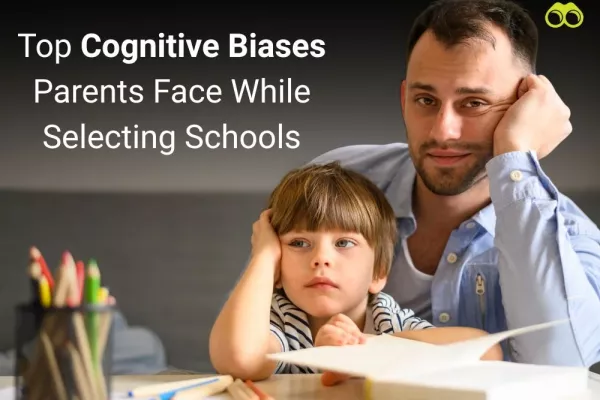Category: School Admissions

The choice of the ideal school is among the most important decisions parents must make for their children. For cities such as Delhi, Mumbai, Bengaluru and Pune the extensive number of well-known schools in the CBSE, ICSE, IB, and Cambridge boards make this decision complicated. Though parents strive to make informed, rational decisions, the truth is that the cognitive biases that influence school choice can influence the decision-making more than they realise.
From confirmation bias during the selection of schools from confirmation bias in school selection to "herd mentality" when it comes to admissions at schools. Psychological shortcuts could cause parents to make choices that may not be most beneficial for their child. Knowing these biases can be the initial step towards eliminating mistakes in selecting schools and in ensuring that your child is receiving an education that aligns with their learning needs, habits, and hopes.
This article focuses on the principal mental biases Indian parents are confronted with when it comes to choosing their schools and explains the ways they affect decisions and gives practical advice on how to get over them.
Today, schools are not simply learning centers and teaching; they're schools that form children's character, interpersonal skills, and base for career development. The highly competitive educational hubs such as Delhi NCR, Bengaluru and Hyderabad the demand for schools that are reputable is much higher than availability. The motivations behind parents choosing high-priced schools frequently reveals that their emotional and social factors override academic factors.
Below are the most frequently used mental factors that influence the choice of schools that affect parents living in India:
Parents usually form an initial perception of the school upon a single source, such as the recommendation of a family member or a commercial--and search for evidence that confirms this perception.
Parents often rely on neighbors and peer groups in making their decisions.
Parents are often prone to let their emotions take precedence over logic.
Parents are prone to comparing all fees for school based on the same "anchor" cost.
Parents heavily rely on the latest or readily available data.
Parents are often accustomed to the same choices instead of looking for other options.
In the cities where admissions requirements are extremely at stake, families often have to apply to multiple schools to "secure the right to sit in."
Effect: Causes financial stress and anxiety.
The bias of availability frequently affects parents, because international schools have greater exposure due to marketing, even if many inexpensive CBSE schools have excellent outcomes.
In order to avoid the mistakes made in choice parents should adopt the following method of organization:
Unpredictable decisions can increase the effect of biases. Begin to research one year ahead.
Take a look at the long-term effects such as alumni accomplishments, Board results, alumni achievements, and comprehensive programs for development.
Parents must contend with Herd Mentality, confirmation bias, emotion bias, the anchoring effects, accessibility bias as well as status quo bias and FOMO when making choices about schools.
Parents are influenced by these issues to place popularity, influence from peers or the cost of education over the quality of instruction and specific needs for children.
Peer influence can provide a feeling of security, however it often results in a herd mentality that compromises the individual needs of each child.
The factors include the need for social validation, satisfaction with emotions, anxiety about missing out and dependence on patterns that are familiar.
Parents need to rely on well-organized tools to compare their children, set clearly defined priorities, get information from multiple sources as well as visit the schools in person prior to making a decision.
The effects of the anchor will make parents evaluate every fee against the initial number they see, which can skew their affordability decisions.
The process of selecting a school is just as much about the psychological aspect as much it's about infrastructure, academics and cost. Understanding and eliminating the cognitive biases that influence school selection will ensure that the decisions are taken to serve the best interests of children and not based on the emotional reaction to schools or the school's herd mentality admissions.
Parents who approach their selection with an open mind and a structured evaluation are more likely to pick the school that best matches the potential of their child. Platforms such as Skoodos simplify the procedure through an open, holistic comparison of the schools within your area, helping to cut through the muck and making an educated choice.
 Blog: Recently Added
Blog: Recently AddedIf you’re a parent in India today, you’ve probably heard about NEP 2020, but you may still be w...
Every parent who is looking at schools today eventually asks this question: If we don’t live in...
Every parent reaches a point where this question quietly starts coming up: Should we consider boardi...
For many families in India, choosing a school is one of the most important long-term decisions they...
For years, higher education in India came with an almost unspoken rule: if you want a “good” de...
For most parents, choosing a school isn’t just an academic decision; it’s emotional, stressful, and...
Deciding on a school today is quite different from what it was a decade ago. Parents are not just co...
While making a decision about a school is not a very easy task, it is now more complex.While making...
Selecting the proper school has never been an easy task. For parents of Indian children, it is often...
A decade ago, school admissions were characterised by queues, forms, physical counselling, and limit...

